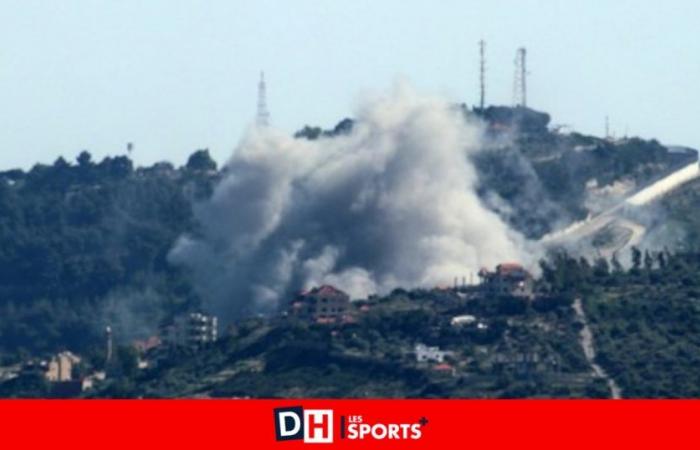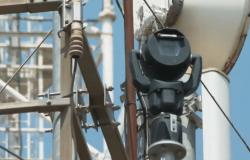
“We do not want war, but we are preparing for any scenario,” Minister Yoav Gallant told the press after a several-day visit to Washington. “Hezbollah understands very well that we can inflict enormous damage on Lebanon if a war is launched,” he added.
The spillover into Lebanon of Israel’s war against Hamas in the Gaza Strip would be “potentially apocalyptic”, the UN humanitarian chief earlier warned as bombings continue in the Palestinian territory and beyond.
During the night from Wednesday to Thursday, witnesses reported bombings in different sectors of the Gaza Strip, while in Lebanon, five people were injured in an Israeli airstrike on a building in Nabatiyeh (south), according to the official Lebanese agency Ani.
The US Army’s Middle East Command said it had destroyed a “radar” of the Yemeni Houthi rebels, allies of Hamas, who target international maritime traffic in the Red Sea and the Gulf of Aden in “solidarity” with the population of Gaza
And in Syria, two people were killed in an Israeli strike shortly before midnight, the official Sana news agency reported, citing a military source. According to the Syrian Observatory for Human Rights (SOHR), the strike targeted a service center of a foundation affiliated with Lebanese Hezbollah and pro-Iranian groups, near the capital Damascus.
“I see this as the spark that will ignite the powder… It is potentially apocalyptic,” warned from Geneva, and shortly before these strikes, the head of UN humanitarian operations Martin Griffiths.
A conflict involving Lebanon “will spread to Syria… will spread to other” territories in the region, leading to “unforeseeable” consequences, he added.
Lebanon, after Gaza?
The war in Gaza has led to an outbreak of violence on the border between Israel and Lebanon, where exchanges of fire are almost daily between Lebanese Hezbollah, an ally of Palestinian Hamas, and the Israeli army.
Israeli Prime Minister Benjamin Netanyahu announced on Sunday that the “intense” phase of fighting was coming to an end in the Gaza Strip and said that afterward, Israel could “redeploy some forces towards the north”, on the border with Lebanon, “for defensive purposes”.
“It seems that Israel, which devastated Gaza, is now setting its sights on Lebanon. We see that Western powers support Israel behind the scenes,” declared Turkish President Recep Tayyip Erdogan for his part.
“Netanyahu’s plans to expand the war to the region will lead to great disaster,” he added as Germany followed Canada in calling on its nationals to leave Lebanon on Wednesday.
“Regional war”
“A war between Israel and Hezbollah could easily become a regional war, with disastrous consequences for the Middle East,” warned American Defense Secretary Lloyd Austin while receiving his Israeli counterpart Yoav Gallant in Washington.
Hezbollah leader Hassan Nasrallah warned last week that “no place” in Israel would be spared by his movement, the day after an announcement by the Israeli army that “operational plans for an offensive in Lebanon ” had been “validated”.
Hezbollah opened the front with Israel in support of Hamas the day after the attack carried out by the Palestinian movement on October 7 in southern Israel, which resulted in the death of 1,195 people, mainly civilians, according to a count. from AFP established from official Israeli data.
Of 251 people kidnapped during the attack, 116 are still held hostage in Gaza, of whom 42 are dead, according to the army.
In retaliation, Israel launched an offensive in the Gaza Strip where more than 37,718 Palestinians, mostly civilians, have been killed since the start of the war, according to the Hamas-led government’s Health Ministry.
“Need water”
The war has caused a humanitarian catastrophe in the territory of 2.4 million people besieged by Israel, where 495,000 people are suffering from hunger at “catastrophic” levels, according to a report released Tuesday by the Integrated Security Classification Framework (IPC), on which UN agencies base themselves.
Water is also lacking in the middle of summer in the overpopulated area, where residents rush with their cans when a truck loaded with tanks arrives.
The opening of a maritime corridor from Cyprus in March allowed 7,000 tonnes of humanitarian aid to be sent to Gaza, of which 6,000 tonnes remain in storage due to looting and violence preventing their distribution, officials said on Wednesday. Americans gathered in Cyprus.
“I have never seen such a difficult or complex environment” for humanitarians, said Doug Stropes of USAID, the US development agency, speaking of “anarchy” and “gangs”.
“The crisis worsened with the arrival of summer. People need water to drink and wash,” testifies Muhammad Bashir, who repairs dozens of tanks damaged or pierced by shrapnel.





